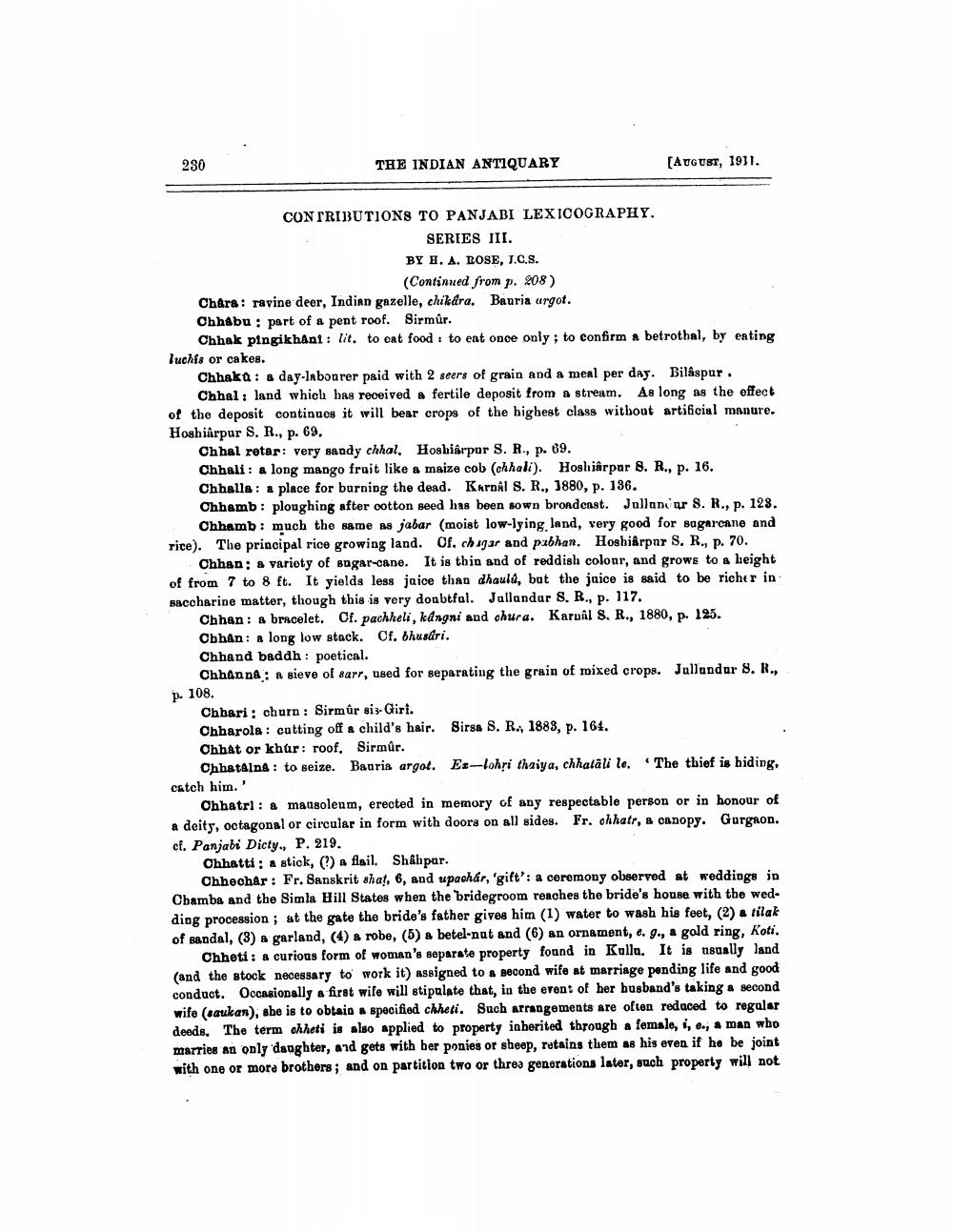________________
230
THE INDIAN ANTIQUARY
CONTRIBUTIONS TO PANJABI LEXICOGRAPHY.
SERIES III.
BY H. A. ROSE, J.C.S.
(Continued from p. 208)
Chara: ravine deer, Indian gazelle, chikara. Bauria urgot. Chhabu: part of a pent roof. Sirmûr.
Chhak pingikhani: lit. to eat food: to eat once only; to confirm a betrothal, by eating luchis or cakes.
[AUGUST, 1911.
Chhaka: a day-labourer paid with 2 seers of grain and a meal per day. Bilaspur.
Chhal: land which has received a fertile deposit from a stream. As long as the effect of the deposit continues it will bear crops of the highest class without artificial manure. Hoshiarpur S. R., p. 69.
p.
Chhal retar: very sandy chhal. Hoshiarpur S. R., p.
69.
Chhali: a long mango fruit like a maize cob (chhali). Hoshiarpur 8. R., p. 16. Chhalla: a place for burning the dead. Karnal S. R., 1880, p. 136.
Chhamb: much the same as jabar rice). The principal rice growing land. Chhan: a variety of sugar-cane.
Chhamb: ploughing after cotton seed has been sown broadcast. Jullandur S. R., p. 123. (moist low-lying, land, very good for sugarcane and Of. chigar and pubhan. Hoshiarpur S. R., p. 70. It is thin and of reddish colour, and grows to a height of from 7 to 8 ft. It yields less juice than dhaulú, but the juice is said to be richer in
saccharine matter, though this is very doubtful. Jallandur S. R., p. 117.
Chhan: a bracelet. Cf. pachheli, kangni and ohura. Karnal S. R., 1880, p. 125.
Chhan: a long low stack. Cf. bhusari.
Chhand baddh: poetical.
Chhanna: a sieve of sarr, used for separating the grain of mixed crops. Jullundur S. R.,
108.
Chhari: churn: Sirmûr si3-Giri.
Chharola: cutting off a child's hair. Sirsa S. R., 1883, p. 164.
Chhat or khur: roof, Sirmûr.
Chhatalna: to seize. Bauria argot. Ez-lohri thaiya, chhatali le. The thief is hiding, catch him.'
Chhatri a mausoleum, erected in memory of any respectable person or in honour of a deity, octagonal or circular in form with doors on all sides. Fr. chhatr, a canopy. Gurgaon. cf. Panjabi Dicty., P. 219.
Chhatti: a stick, (?) a flail. Shahpur.
Chheohar: Fr. Sanskrit shat, 6, and upachár, 'gift': a ceremony observed at weddings in Chamba and the Simla Hill States when the bridegroom reaches the bride's house with the wedding procession; at the gate the bride's father gives him (1) water to wash his feet, (2) a tilak of sandal, (3) a garland, (4) a robe, (5) a betel-nut and (6) an ornament, e. g., a gold ring, Koti. Chheti: a curious form of woman's separate property found in Kulla. It is usually land (and the stock necessary to work it) assigned to a second wife at marriage pending life and good conduct. Occasionally a first wife will stipulate that, in the event of her husband's taking a second wife (saukan), she is to obtain a specified chheti. Such arrangements are often reduced to regular deeds. The term chheti is also applied to property inherited through a female, i, e., a man who marries an only daughter, and gets with her ponies or sheep, retains them as his even if he be joint with one or more brothers; and on partition two or three generations later, such property will not




